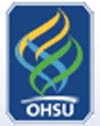Oregon LEND Collaborates with Pediatric Hospital to Improve Volunteer Education & Training in Interactions with Patients with Special Health Care Needs
April 21, 2011

|
The LEND Program at the Child Development and Rehabilitation Center (CDRC) at Oregon Health and Science University (OHSU), in Portland, OR, has been engaged in a new partnership to both enhance leadership training activities and strengthen the care provided within our institution's pediatric hospital. Starting in 2009, Dr. Kurt Freeman, psychology training director, Dr. Kim Guion, a former LEND trainee from pediatric psychology, and Ms. Trina Timbreza, Volunteer Services Coordinator, recognized the apparent need in working together to improve the education, training, and support volunteers receive regarding interactions with patients with neurodevelopmental disabilities and special health care needs.
This activity has multiple goals, both in relation to the education and continued development of LEND trainees and to desired outcomes for volunteers and populations they serve. Specifically, this leadership experience provides LEND trainees with the opportunity to collaboratively partner with an existing system of volunteer services to a) determine mutually beneficial activities, b) implement enhanced training to volunteers for special populations, and c) establish strategies for obtaining feedback to evaluate the impact of the partnership. Trainees are gaining valuable experience in learning how to better understand an existing program and how their knowledge and expertise can be of benefit to that program, and how to develop and implement formal educational plans with volunteers. The desired outcomes for volunteers are that they will have increased understanding of diverse patient populations and their respective needs, and possess practical skills-based knowledge for interacting with youth with disabilities and special health care needs.
Activities accomplished through this partnership have emphasized a series of interactive trainings provided by the LEND trainees to the volunteers. These trainings have emphasized strategies for interacting with individuals with various developmental differences. For example, training regarding strategies for interacting with youth with non-verbal communication abilities and physical differences has been offered. Additionally, a training on Autism Spectrum Disorders, which was recently offered, focused on providing education regarding this spectrum of diagnoses, dispelling common myths regarding Autism, and discussing interaction strategies. In addition to these presentations, the LEND trainees are working with the director of Volunteer Services to create activities that supplement the volunteer experience, including development of a program where LEND trainees provide live observation and feedback to volunteers, creating a list-serve for questions from volunteers where trainees can provide prompt and discipline-specific feedback, and holding a question and answer panel and discussion for those interested in pursuing a career in the health care profession.
Thus far, the partnership has been well received and fruitful. As a result of this partnership, the Director of Volunteer Services has created and staffed volunteer positions specifically for those interested in working with youth with disabilities and special health care needs. Further, feedback from trainings has been quite positive. The LEND team at the CDRC is hopeful that this partnership will continue to foster a collaborative relationship between volunteers, LEND trainees, and clinicians.







